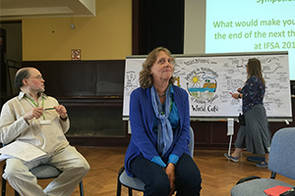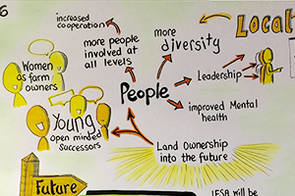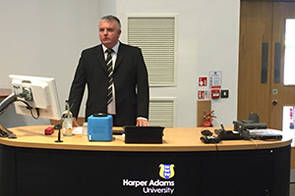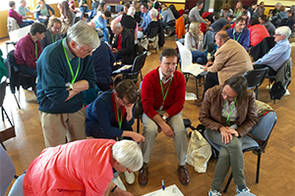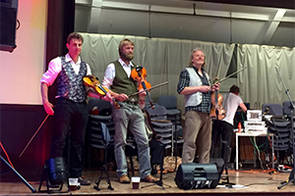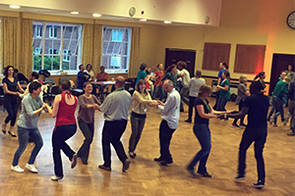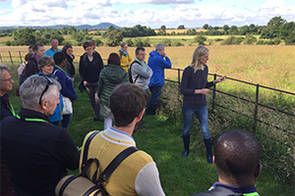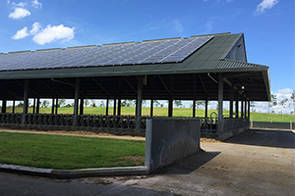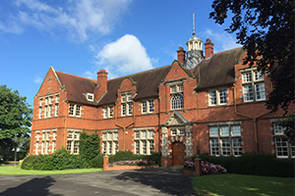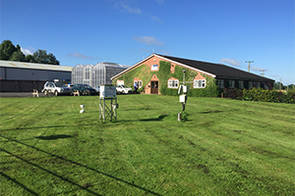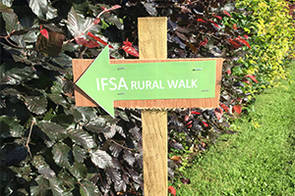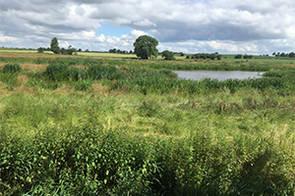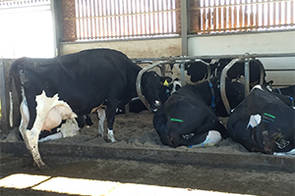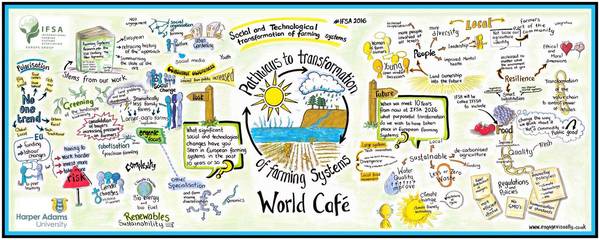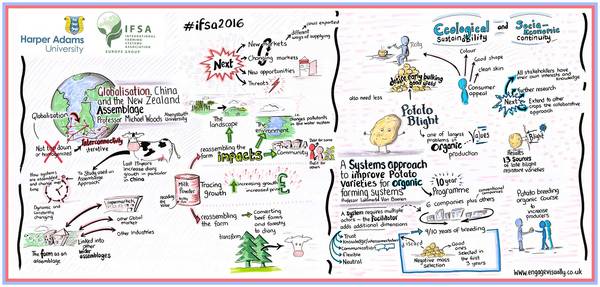
Social and technological transformation of farming systems: Diverging and converging pathways
The 12th European IFSA Symposium was held 12-15 July 2016 in Newport, UK. It was organised by Andy Wilcox at the Harper Adams University: conference website.
Opening World Café
The opening World Café was organised by Nadarajah Srikandarajah and Chris Blackmore, with graphic recording by Debbie Roberts
The questions we discussed in the groups were (see graphic record below):
What significant social and technological changes have you seen in European farming systems in the past 10 years or so?
When we meet in 10 years from now at the IFSA 2026, what purposeful transformations do we wish to have taken place in European farming systems?
Plenary presentations
Edith Lammerts van Bueren: A systems approach to improve potato varieties for organic farming systems (graphic record of the presentation) (paper, project website)
Michael Woods: Globalization, China and the New Zealand dairy assemblage(graphic record) (project website)
Closing plenary
In the closing plenary Chris Blackmore summarised key issues (presentation).
The convenors also reported the key messages that came out of the presentations and discussions in their workshops.
This was the first IFSA Symposium where we encouraged the use of Twitter (#IFSA2016)
Some pictures of the IFSA 2016
Overview of workshops
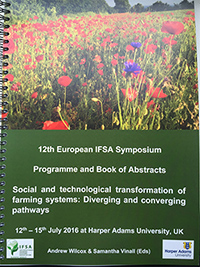
The proceedings include the full papers that were presented in one of the 29 workshops which were grouped around 5 themes. The papers have undergone a review process before being included in the proceedings.
Theme 1: Innovation, knowledge and learning processes
WS 1.1 Generating spaces for innovation in agricultural and rural development
WS 1.2 Monitoring and evaluation for learning and innovation
WS 1.3 Using a co-innovation approach to improve innovation and learning
WS 1.4 From farmer to 'eco-entrepreneur' - Participatory curricula development
WS 1.5 Pathways towards sustainability - The role of farmers' experiments and innovations
WS 1.6 Merits and limits of innovation platforms to promote sustainable intensification
WS 1.7 Scaling up and scaling out transformative farming practices
WS 1.8 Cooperation as a key issue for innovation and learning processes
WS 1.9 Inclusive innovation
WS 1.10 Practical experiences from the first years of EIP-Agri implementation
Theme 2: Methods and frameworks of farming systems transformation
WS 2.1 Sustainability assessments at farm-level for catalysing practical change
WS 2.2 Well-being in rural areas: How is it affected by different farming systems?
WS 2.3 Temperate agriculture - Sustainability assessment beyond the farm-level
WS 2.4 Beyond participatory methods
WS 2.5 Management of interdisciplinary research processes
Theme 3: Pathways towards sustainable agri-food systems: tensions or synergies?
WS 3.1 Sustainability of food chains: contested assessments
WS 3.2 Pathways for land use: the sustainable avenue of agroforestry
WS 3.3 Boundary spanning between agroecological and conventional production systems
Theme 4: Emergence and application of new technologies
WS 4.1 Boosting research outputs: novel approaches for integrating research translation with interactive co-innovation
WS 4.2 ICT to help with participatory approaches for the agroecological transition of agriculture
Theme 5: Enabling governance, policy and institutions
WS 5.1 Developing agricultural advisory systems for innovation
WS 5.2 Farm succession, inheritence and retirement
WS 5.3 Rural development policies in the peripheral Southern and Eastern European regions
WS 5.4 Exploring farmers' conditions, strategies and performances
WS 5.5 Value chain research and developments
WS 5.6 Food governance for metropolitan and local food systems
WS 5.7 There are other options: boundary issues in innovation system governance
WS 5.8 Enabling innovation: the innovative capacity of farmers and rural institutions
WS 5.9 Public food procurement policies - Local and organic food
Some impressions of the IFSA 2016
